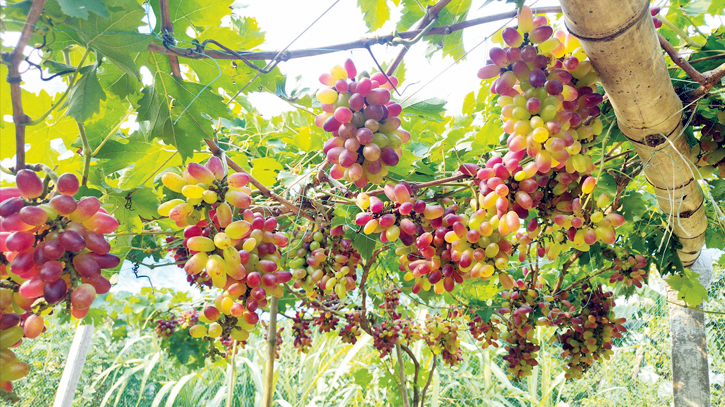
Farmers in Jhenaidah have found success in cultivating exotic grapes, with Abdur Rashid leading the way in commercializing this venture. Photo: Messenger
Farmers in Jhenaidah, a district in the southern-western region of Bangladesh, are witnessing a remarkable agricultural transformation as farmers delve into the cultivation of exotic red and black sweet grapes, fetching lucrative prices in the market.
Among the pioneers in this endeavor is Abdur Rashid, a local farmer hailing from Jugihuda village in Maheshpur upazila. Rashid's success story in commercial grape farming has captured the attention of agricultural enthusiasts nationwide. Cultivating a variety of grapes, including Baikunur, Akulo, Jackson, and Silva, Rashid has utilized approximately 80 percent of his land for this venture, yielding fruits that boast superior aroma, taste, and size compared to market alternatives.
Rashid's journey into grape cultivation began around 2021 when he procured seedlings from India and Italy, planting 75 grape seedlings of Super Sonica, Samsam, and Black varieties on a portion of his land. Encouraged by the success of his initial efforts, Rashid expanded his grape cultivation in 2023, planting around 200 seedlings of five different varieties. Notably, the Russian Bynukur variety has proven to be particularly prolific in Rashid's vineyard, which now stands as a testament to the potential of grape farming in the region.
Visitors flock from far and wide to witness the splendor of Rashid's vineyard, where clusters of red, black, and green grapes adorn the landscape. Among them is Abdul Jalil from Mymensingh, who expressed his desire to emulate Rashid's success and venture into commercial grape cultivation. The allure of Rashid's grapes extends beyond mere admiration, with fruit traders like Tarikul attesting to the superior quality of his produce, which commands prices ranging from Tk 300-350 per unit.
Rashid's transition from guava cultivation to grape farming underscores a strategic shift towards meeting evolving market demands. Emphasizing the affordability and profitability of grape cultivation, Rashid dispels notions of high investment, stating that one bigha of land requires only 160-170 seedlings, with the first-year yield ranging from 10-20 kg per tree. His annual earnings of 2 to 3 lakh taka per bigha of land serve as a testament to the viability of grape farming as a lucrative enterprise.
Yasmin Sultan, the Agriculture Officer of Maheshpur Upazila, lauds Rashid's pioneering efforts and acknowledges the pivotal role of technical assistance provided by the Agriculture Department in facilitating his success. With grape cultivation poised to complement existing fruit varieties like guava, dragon fruit, and Chinese apple in Maheshpur upazila, Sultan predicts a surge in agricultural diversity, leveraging the region's conducive soil conditions to foster further growth in the sector.
As farmers like Abdur Rashid continue to chart new frontiers in agriculture, the landscape of Jhenaidah undergoes a paradigm shift, with exotic grape farming emerging as a beacon of innovation and prosperity in the heart of rural Bangladesh. His efforts have not only transformed his own fortunes but also sparked a ripple effect, inspiring neighboring farmers to explore the potential of grape cultivation. With each passing season, the vineyards of Jhenaidah flourish, heralding a new era of agricultural prosperity driven by innovation and entrepreneurial spirit.
Messenger/Fameema








